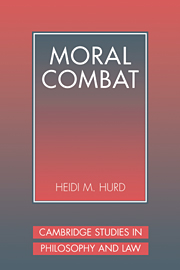Book contents
- Frontmatter
- Contents
- Preface
- Acknowledgments
- Part I The Dilemma of Legal Perspectivalism
- Part II Sources of the Dilemma of Legal Perspectivalism
- 2 The Rejection of Moral Relativism
- 3 The Indefensibility of Practical Authority
- 4 The Failure of Influential Authority
- 5 The Limits of Advisory Authority
- 6 A Defense of Theoretical Authority
- Part III The Moral Case for Legal Perspectivalism
- Part IV The Moral Case Against Legal Perspectivalism
- Part V Resolving the Dilemma of Legal Perspectivalism
- Bibliography
- Index
5 - The Limits of Advisory Authority
Published online by Cambridge University Press: 05 November 2011
- Frontmatter
- Contents
- Preface
- Acknowledgments
- Part I The Dilemma of Legal Perspectivalism
- Part II Sources of the Dilemma of Legal Perspectivalism
- 2 The Rejection of Moral Relativism
- 3 The Indefensibility of Practical Authority
- 4 The Failure of Influential Authority
- 5 The Limits of Advisory Authority
- 6 A Defense of Theoretical Authority
- Part III The Moral Case for Legal Perspectivalism
- Part IV The Moral Case Against Legal Perspectivalism
- Part V Resolving the Dilemma of Legal Perspectivalism
- Bibliography
- Index
Summary
I have argued thus far that, to account for the persisting intuition that we are bound by the law, it is necessary to seek a source of legal authority that does not suggest that the law subjects us by imposing obligations unique from those already imposed by morality. Two final theories of legal authority fit this bill, each construing the power of law as epistemic rather than moral. The first theory, which I shall explore in this chapter, I shall call the theory of advisory authority. The second one, which I shall defend in Chapter 6,1 shall call the theory of theoretical authority.
Both of these theories provide accounts of how law can be characterized as a heuristic guide to the moral obligations and permissions that I have argued alone comprise the reasons for action that determine how citizens and officials ought to act. Both construe legal authority as a form of epistemic authority. The first accords lawmakers epistemic authority, construing the laws they pass as the advice of those possessed of moral expertise. The second theory locates the authority of law not in the expertise of its authors, but in the law itself. According to this second theory, laws are authoritative if, regardless of the beliefs or intentions that motivated them, they enable persons to act morally more often than would otherwise be possible. As I shall argue, while there surely are persons who possess advisory authority, we have compelling reasons to think that the authority of the law is better construed as theoretical, rather than advisory.
- Type
- Chapter
- Information
- Moral CombatThe Dilemma of Legal Perspectivalism, pp. 125 - 152Publisher: Cambridge University PressPrint publication year: 1999



